Bahrain's socio-economic success and political growth are the result of prudent government policies aimed at providing a secure, peaceful and rewarding atmosphere for its people. Wise use of its limited oil resources has enabled it to develop a modern infrastructure which has attracted a large number of international financial institutions, a growing list of trading and manufacturing enterprises as well as an expanding tourism industry.
For the third year in succession the 1998 United Nations Development Programme (UNDP) Human Development Report (HDR) places Bahrain in first position among Arabian countries on its Human Development Index, thus acknowledging the comprehensive strides that Bahrain has made in its nurturing of a modern caring society. As a result of regional and international recognition for its achievements, Bahrain has been chosen to join the UN Security Council as non-permanent member for the 1998/199 session.
Development of human resources has yielded tangible gains particularly in diversifying national income revenues and maximum individual contributions towards the country's success. Bahrain is a member of the GCC, the Arab League, the UN, IMF, WTO, the World Bank, the Arab Fund, the OIC, the Islamic Development Bank and many other international organisations.
Government
The present Amir of Bahrain
HH Sheikh Isa bin Sulman Al Khalifa, has been its Head of State since
December 16, 1961, and is architect of its modern socio-economic
development. He has played a vital role in the country's renaissance,
providing wise judgment and decisive leadership. The preset governmental
infrastructure was defined by two royal decrees, issued on August 14,
1971, Bahrain's Independence Day, when Bahrain reaffirmed its status as a
fully independent sovereign state. The first tackled the new political
system, declaring the official title of the country as The State of
Bahrain with the Amir as the Head of State. The second decree dealt with
the system of government, restructuring its cabinet under the chairmanship
of HH Sheikh Khalifa bin Sulman Al Khalifa. The constitution comprises 108
articles within five main sections chapters dealing with: (a) the nature
of the State and system of government; (b) the basic constituents of
Bahraini society such as the family, social security, scientific research
etc. (c) the rights, duties, personal liberties, and freedom of thought
etc. of the individual; (d) separation of powers; (e) general rules and a
conclusion.
According to the constitution Bahrain is an Arab-Islamic independent
sovereign state, its people are part of the Arab nation and its territory
is part of the Arab world as a whole. The Head of State is chosen by
hereditary accession and the system of government is a democratic one in
which sovereignty is practiced by the people of Bahrain who are the source
of all powers. Islam is the religion of the State and Sharia laws are a
main source of legislation while Arabic is the official language. There is
separation of powers into legislative authority, executive authority and
judicial authority.
Amiri decree No. 10/1992, established a Consultative Coucil or Shura which
has been strongly supported by HH Sheikh Isa since it embodies the
principles stated in the preamble of the constitution regarding its
forward looking nature. The Consultative Council itself is composed of 40
members and the speaker is elected by council members. It held its first
session on January 16 1993 and serves for a four year term renewable by
Amiri decree commencing from the date of its first convening. The council
session commences, upon convocation by HH the Amir of the first Tuesday of
the first week of October and continues until the end of May in the
following year. It can also convene an emergency session upon the request
of the Amir.
The Country
Bahrain is an archipelago
situated in the shallow waters of the Gulf of Salwa in the centre of the
Arabian Gulf. Named Dilmun in earlier times, it is often associated with
the legend of the Garden of Eden and sometimes referred to as 'The Pearl
of the Gulf'. Its northern and western shores appear oasis-like in this
generally desert region, their fertility relying on subterranean aquifers
which draw water from huge underground aquifers. It has an approximate
land area of 106,550 sq. kms and its capital Manama, is located on the
largest of its islands which occupies 85 percent of the country's total
area and is linked with Saudi Arabia via the King Fahd Causeway which was
opened in November 1986.
Most of Bahrain's islands are low surfaced, rising less than 60 meters
above sea level, with Jebel ad-Dukhan as the main exception and forming
the highest point in the country with an altitude of 122 meters above sea
level. A five to six kilometer wide fertile plain, extends along the
northwest and northern coast into the heart of Manama. Most of these
arable lands comprise date groves and vegetable farms. Since time
immemorial Bahrain has been known as the 'The Land of Eternal Youth' and
according to the Sumerian legend, recounted in the Epic of Gilgamesh, was
blessed with an unusual abundance f the two essential elements of life,
water and food. Bahrain has been particularly famous for its pearls,
agricultural produce (especially dates) and fisheries, as well as being a
buoyant centre of communications and trade since the dawn of history.
Its climate is moderate by its island nature, with the surrounding sea
helping to keep it a little cooler than mainland areas during summer and
somewhat warmer during winter. Rainfall is low and somewhat irregular with
most falling during winter months. Summers are hot and dry with humidity.
January is the coldest and June the hottest month.
History
At the height of Bahrain's
Dilmun era which which lasted from around 2250 to 1800 BC, the major city
of Qal'at al Bahrain had at least 7000 people in residence. A total of
150,000 burial mounds were built on the island over a 500 year period and
Dilmun's strong links with Qatif and Dharhan in present day Saudi Arabia,
Failaka in present day Kuwait, and Umm an Nar in present day UAE, are
clearly evidenced by archaeological finds of stone seals, pottery and
other artefacts. The Sumerians referred to the island of Bahrain as Dilmun
and a text dated 2300 BC ("...made the Meluhha ships, the Makkan
ships, the Dilmun ships tie up alongside the quayside of Agade")
reminds us of the trading links that were already established by this time
within the Gulf region. Later the Greeks referred to this land as "Tylos"
and one of Alexander the Great's fleet of vessels visited Bahrain in 324
BC. Pliny, writing in approximately 100 AD, refers to Tylos (Bahrain) in
connection with its fine pearls and the map of Ptolemy, made around 200 AD
shows Tylos in the location of Bahrain.
The first Arab settlements on Bahrain seem to have occurred around the
period 300 BC and from that time on their presence consolidated and grew.
Bahrain eventually became known to them as "Oraal", a name
apparently derived from a popular idol worshipped during this period by
the Rabyah tribe who controlled the island. Islam was officially embraced
by the islanders in 630 AD and they maintained their loyalty during the
successive Islamic caliphates. A period of unrest around the beginning of
the second millennium led, in 1058 AD, to Abu-l-Bahul's declaration as
local prince and a subsequent period of upheaval.
Bahrain's strategic location encouraged the Portuguese to establish a
presence on the islands in 1521 and to reinforce their hegemony until 1602
when they were evicted by a combined force of Bahraini people supported by
Persian forces under Shah Abbas the Great. This led to a period of Persian
influence which continued in an irregular manner until 1718 when Omani
forces caused a Persian retreat from Bahrain and a temporary annexation of
it under Oman. A year later the Persians returned and negotiated a
re-establishment of their control, but this time under the authority of a
local inhabitant rather than an imposed foreigner. In 1783, Zubara, which
was then occupied by the Al Khalifa tribe, led by Ahmed Al Khalifa, was
invaded by the Persians. Assisted by Ahmed cousins, the Al Saba from
Kuwait, the Al Khalifa defeated the Persians at Zubara and then attacked
the occupying forces on the main island of Bahrain where they were equally
successful, restoring national sovereignty. Sheikh Ahmed bin Mohammed Al
Khalifa subsequently became known as Ahmed Al Fatih (Ahmed the Conqueror)
and his rule over Bahrain is considered as the dawn of a new era
characterised by stability and prosperity.
The Al Khalifa dynasty's rule over Bahrain, which thus began in 1783 has
continued unbroken to the present period. Following the death of Ahmed Al
Fatih in 1796, he was succeeded by Sulman bin Ahmed Al Khalifa who for a
time moved back to Zubara. Returning to Bahrain in 1820 he signed,
together with his brother Abdullah, the General Treaty with the East India
Company on behalf of Bahrain. Sheikh Sulman died in 1825 and was succeeded
by his son Sheikh Khalifa were Muhammed bin Khalifa bin Sulman; his
brother Sheikh Ali bin Khalifa bin Sulman; his cousin Sheikh Muhammed bin
Abdullah, and then Sheikh Isa bin Ali Al Khalifa who ruled Bahrain for
more than 60 years.
During Sheikh Isa's reign Bahrain witnessed the establishment of
municipalities, law enforcement authorities, customs, education, a
judiciary and other aspects of social order. In 1932 he was succeeded by
his son Sheikh Hamad bin Isa bin Ali Al Khalifa who ruled until 1942. This
period witnessed the discovery of oil in Bahrain, the first place in
Arabia where it was discovered, and eventual exploitation of this resource
helped Bahrain to enter a new era of development with introduction of
health, electricity, water, and education in addition to a construction
industry which, included, among its various achievements, completion of
Sheikh Hamad's causeway connecting Al Muharraq with Manama city.
Following Sheikh Hamad's death in 1942, Sheikh Sulman bin Hamad Al Khalifa
became ruler and continued the process of development until his death in
1961 when he was succeeded, on December 16, 1961, by his son HH Sheikh Isa
bin Sulman Al Khalifa, the present Amir of Bahrain. Sheikh Isa's
leadership has seen Bahrain's modern development truly take hold. There
have been dramatic improvements in all fields of socio-economic
development as described elsewhere in this chapter.
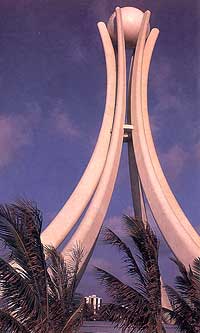
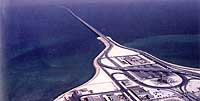
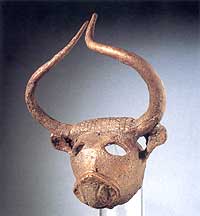
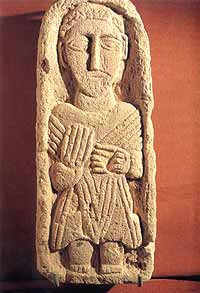
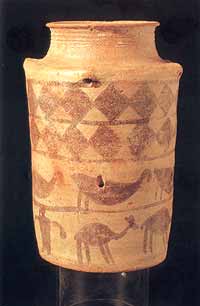
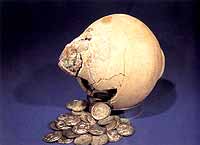
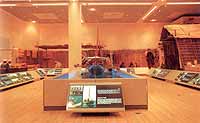
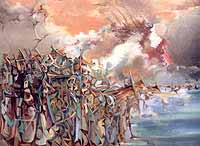
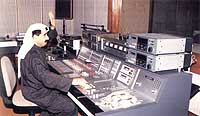
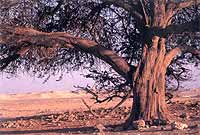
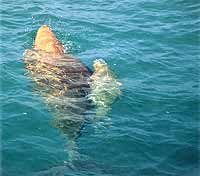
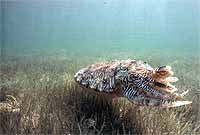
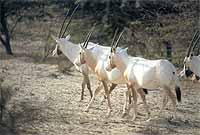
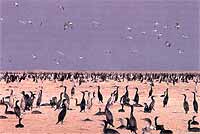
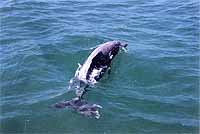
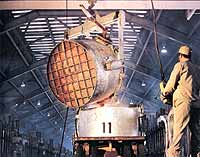
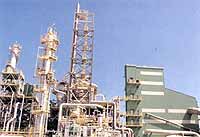
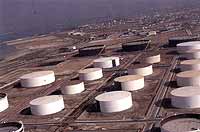
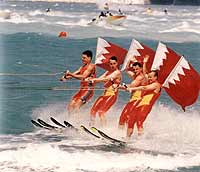
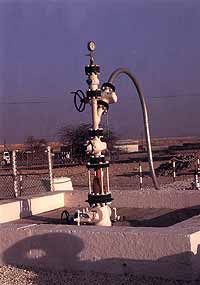
Bahrain's long history is
closely interwoven with the sea and it is therefore not surprising that
its traditions have a distinctly maritime flavour, ranging as they do from
songs and dances associated with pearling and fishing to the skills of
boat building and sailing. Bahrain is also part of the regional tribal
culture involving crafts, stories, poetry, song and dance. Today many of
the latter are still practiced on special occasions while practical art
forms such as cloth weaving, pottery, and basketry are kept alive, often
with various forms of government support. Traditional carpentry is often
used to adorn modern buildings while embroidery is highly valued in dress
making and for home decorations. Bahrain's rich heritage is nurtured and
protected by the Bahrain government, which tackles programmes through a
number of organisations.
The Ministry of Cabinet Affairs and Information has relied upon a
practical strategy in tackling cultural issues, that views culture as a
basic and fundamental dimension in the process of achieving comprehensive
development at all socio-economic and political levels. Culture is also in
the front-line of defence aimed at confronting any malicious intentions or
actions that seek to jeopardise the country's national achievements. In
addition to that it is considered to be an impetus which will give
momentum to human development.
In order to effectively achieve its priorities the Ministry formulated a
programme which includes the following objectives: (a) to maintain and
preserve heritage and to give due respect to preservation of
archaeological sites since they reflect the history and civilisation of
the country; (b) to encourage the artistic and intellectual movement by
caring for and helping artists to publish and circulate their works and to
protect their intellectual property rights; (c) to encourage and support
Bahraini journalists and media staff and provide them the opportunity to
participate in training and qualifying courses; and (d) to develop and
modernise the mass media and its tools in order to cope with the
overwhelming progress taking place in this field.
The government has also made a commitment to place special emphasis on
reflecting Bahrain's positive image at all levels. This includes promotion
of Bahrain as a tourist destination and as a centre for exhibitions and
conferences.
Bahrain is considered to be a pioneer country in press and printing.
The first newspape published in Bahrain was launched in 1939 and was
called Bahrain News. The Bahrain Daily News appeared a few years later
together with some weekly magazines. The Ministry of Information Printing
House was launched in 1978 to meet printing needs of the other ministries
and government institutions and particularly to print the Official Gazette
and Bahrain Cultural Magazine and This is Bahrain magazine.
Radio Bahrain is the oldest of its kind in the Gulf region, having been
originally launched in 1941 during the Second World War. It was closed in
1945 but relaunched in July 1955, initially with four hours broadcasting a
day. In the 1960s it extended its programming and in 1981 moved into new
premises. In the early 1990s Radio Bahrain commenced 24 hour broadcasting
and introduced two short-wave transmission channels.
Bahrain Television started operating in 1973, initially with five hours of
programming each day. In October 1996 Bahrain Satellite Broadcasting was
introduced.
In January 1993 Bahrain Radio and Bahrain Television merged to form a
single corporate entity. The new broadcasting authority, established under
an Emiri decree, aims at achieving the highest standards of transmission
utilising the latest information technology, within the guidelines of
state policy.
Apart from the state policy towards encouraging the Bahraini cultural
movement at all levels, the government established the National Council
for Culture and Arts. Simultaneously, a high council for tourism was
established in order to formulate plans and programmes to attract
tourists. This council is responsible also for developing and improving
tourism infrastructures and its activities, in addition to promoting
Bahraini heritage and preserving the folkloric sites.
In 1997 Bahrain was placed in second in a list of the most attractive
tourist locations in the Middle East and first as the most promising
destination at the Hong Kong tourism exhibition.
Environment and Wildlife
The main objective behind
the establishment of the Environment Affairs Agency Department is to
formulate policies and plans towards conserving the environment, achieving
sustainable development and protecting and developing marine and
terrestrial wildlife through effective natural resources management
strategies. The Agency programme covers the following areas of activity:
(a) regulation and environmental legislation; (b) environmental
forecasting and planning; (c) environment evaluation; (d) contamination
control; (e) mobilising efforts to study environmental issues and
problems; (f) garbage management; (g) promoting environmental awareness;
(h) developing international cooperation in this field.
In 1997 competent authorities conducted a survey covering environment
issues raised in 1996 in a bid to address them. Also the survey was
intended to highlight the environment problems facing citizens in order
that these may be resolved as quickly as possible.
Whilst the lush northern region of Bahrain harbours a wealth of wildlife,
interest lies mainly on Bahrain's nutrient rich eastern shores, hosts to
thousands of migrating shorebirds; its scrub desert areas which support a
number of specially adapted species of plants and animals; its offshore
islands which are home to a number of rare and endangered species; and its
shallow saline coastal waters which support a rich marine life including
dugong, green turtle and sea-snakes.
Al Areen Wildlife Park, the brainchild of HH Sheikh Hamad bin Isa bin
Sulman Al Khalifa, Crown Prince of Bahrain, is divided into two parts, one
which is open to the public and the other which forms an off-limits
reserve where access is only possible with special permission. Access to
the park is by bus from the main entrance and follows a tar macadam road
from which one can observe a variety of Arabian mammals such as Arabian
oryx, and sand gazelle, together with other ungulates. Many wild birds are
attracted to the park which plays a vital role in educating the public
concerning conservation issues.
Economic Development
As part of its preparation
for the Millennium, Bahrain's economy is undergoing a degree of adaptation
in order to improve and develop its infrastructural base, and to improve
public utilities and services both for citizens and foreign investors. The
state also endeavours to provide a favourable investment climate in order
to attract local, regional and global investors. It utilises well prepared
feasibility studies as a means of stimulating investment in Bahrain and
achieving sustainable annual growth areas. In addition to this the
government is making efforts to create increased job opportunities and to
raise living standards in order to secure for its people a good standard
of life.
To realise these ambitions and aspirations in the face of the high levels
of economic competition, and coinciding with the sudden growth of
information technology, Bahrain is focusing on human development and
preparing its people to shoulder the challenges of the high technology
age. In so doing they also seek to strengthen the value of work both for
its personal benefits, but also as a means towards betterment of the
nation as a whole.
The government's economic strategy aims to bolster a free and liberal
economy, with equal opportunities for all people, in which a favourable
atmosphere exists to enable the private sector to take initiatives in
economic development.
The Bahrain Monetary Agency administers the monetary policy and supervises
the financial sector, regulating the banking industry and vitalising its
role and contribution to economic development while enhancing the
country's position as a unique international financial centre. There are
presently 182 licensed banking institutions in Bahrain; i.e. 19 commercial
banks; two specialised banks; 45 foreign offshore' banking units; 32
investment banks; 41 representative offices; 26 money exchanges; 7
brokerage houses; together with 10 investment and other financial
consultants offices. In addition there are 285 investment funds
administered in Bahrain under the management of 35 financial institutions.
The Islamic Banking sector has also received an impetus and is being
actively encouraged to grow further. At present 11 Islamic banks and
financial institutions are located in Bahrain.
Bahrain has joined the World Trade Organisation, WTO, and is reviewing
laws and trade systems so as to conform with the prerequisites of full
membership of this organisation.
The Bahrain Stock Market has shown steady growth with 530 million shares
traded by October 31, 1997, having a total value of BD 139 million in 1483
contracts. Meanwhile the Index recorded a rise from 1533.30 to 3190.33.
The Bahrain Promotion Board is promoting opportunities for investment in
Bahrain with particular emphasis on its efficient and advanced services
sector. The campaign has succeeded in convincing a significant number of
companies to move their regional headquarters into Bahrain. Incentives
include full entitlement of foreign investors to 100 percent ownership of
their projects; provision of a convertible national currency at a stable
exchange rate to the US dollar; exemption from income taxes for companies;
possibility of repatriation of invested capital; and finally low rates for
using national utilities, energy, and telecommunications network including
digital facilities.
Bahrain's dependence on oil has shifted dramatically from 36 percent of
GNP 20 years ago to 20 percent in 1996. Meanwhile the services sector has
paid dividends in terms of economic development.
Bahrain's oil industry has shown impressive growth with daily production
capacity reaching 14,124 barrels by 1996. Given the importance of
Bahrain's industrial base, the Ministry of Industry is concentrating on
policies aimed at developing the industrial sector and giving priority to
its needs in order to encourage it to develop further. It is also seeking
to finalise legislation and regulations in connection with industrial
establishments, renting of industrial land and the relationship between
commercial property investors and operating companies.
Social Development
Bahrain's position, in
first place among Arab countries on the UNDP Human Development Index,
issued in September 1998, is an indication of the strong emphasis that has
been given to the country's social development in all fields. A brief
outline of the education sector vividly illustrate this.
Bahrain's first elementary school was opened in 1919, followed by the
first girls' elementary school in 1928. The first industrial school was
opened in 1936, while the first girls' secondary school opened in 1951.
The religious school, established in 1943 to graduate Sharia law scholars,
became known as the Religious Institute in 1960. The Teachers College was
opened in 1966 and Khaliji Technology College was incorporated into
Bahrain University in 1968. Private education began with Manama School in
1952 and the Private Education Act was passed in 1961. Meanwhile the Joint
National Committee for Adult Education was formed in 1971. Bahrain
University College for Science, Arts, and Education (Bahrain University)
was inaugurated in 1979 while the Arabian Gulf University commenced its
operations with a faculty of medicine.
129,748 students were registered in 1996, of whom 109,890 attended public
sector government schools and 19,858 attended private schools. At
the time of writing there are 218 schools, 180 government run and 38
privately administrated. The total investment in this sector in 1998 was
BD 82 million.
The health sector has also witnessed exponential growth, culminating in
the 1997 opening, by Prime Minister HH Sheikh Khalifa bin Sulman, of the
expanded Al Sulmaniah Medical Complex which offers the most advanced
diagnostic and medical facilities. Considered to be the most extensive
utility of its kind in Bahrain, it occupies 45,000 sq.m.
On an international level Bahrain was elected from among 192 states, to
chair the 51st General Session of the International Medical Society to be
held in Geneva during May 1998. This prestigious appointment reaffirms
Bahrain's status and its scientific contributions within the field of
medical science. Meanwhile, Bahrain has adopted the World Health
Organisation slogan: "Health for all by 2000" and has put the
words to practice by succeeding in extending elementary medical services
to provide 100 percent of coverage throughout the entire country.
In 1996 there were four government hospitals and three private hospitals
in addition to the military hospital. Also there were 19 government
medical centres and five maternity centres. The total investment in the
health sector in 1998 was BD 58 million.
Promoting the interests of young people also falls within the remit of the
Youth and Sports Authority which develops youth and sports programmes
aimed at training young people to meet the challenges of adulthood. The
Authority also includes under its wings, the Junior Science Clubs, which
in turn surprise child and youth science centres, together with the Sulman
Cultural Centre for children.
The Ministry of Labour and Social Affairs has identified the following
objectives in relation to its work: (a) to contribute in achieving the
socio-economic development; (b) to contribute in extending social security
benefits; (c) to contribute in providing nationals with appropriate jobs
and (d) to increase productivity. The Ministry has also been working to
promote Bahrain as a regional centre for training and developing human
resources. In this capacity it has updated and extended its centre to
provide a capacity of 5500 trainees. The Higher Council for Vocational
Training has also been involved in the training field, qualifying more
than 10,528 Bahrain workers over the last 16 years. Meanwhile the Ministry
itself stimulated a number of new local community development programmes
through improving and vitalising the roles of the 17 social centres spread
throughout Bahrain
Bahrain at a Glance
Location: Bahrain is situated in the shallow Gulf of Salwa, in the centre of the Arabian Gulf and is now connected to Saudi Arabia by the King Fahd Causeway.
Area: Approximately 706,550 sq.kms.
Climate: Bahrain's climate is tempered somewhat by its islands nature and the moderating effect of the surrounding sea. Winter temperatures are around 25o to 27o while summers enter the 40s. Humidity is lowest in summer months. Rainfall fluctuates dramatically from less than 20 mm to over 200 mm per year.
Population: Bahrain is one of the first countries in the Arab world to undertake, in 1941, a scientific census of its population. Latest census figures, from 1991, indicate a population of 508,037 with three per cent annual growth rate which is considered very high by international standards.
Independence Day: August 14.
National Day: December 16.
Religion: Islam.
Language: Arabic.
Capital: Manama.
Time: 3 hours ahead of GMT.
Currency: Bahraini Dinar.
EGYPT - SYRIA - JORDAN